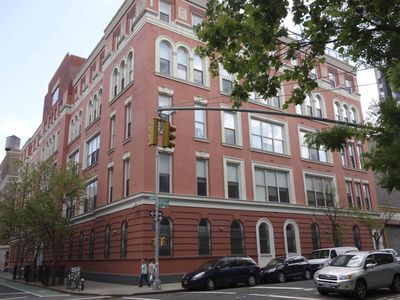
The City Comptroller’s report says city agencies failed on multiple levels
At least one of the several investigations into the sale of Rivington House on the Lower East Side has concluded, and the results are in. Comptroller Scott Stringer has released a report [PDF] that details the findings from his office’s five month investigation into the matter, and essentially concludes that the city missed several opportunities to halt the removal of the deed restrictions on the property, but the report leaves Mayor Bill de Blasio blameless.
Here now are some of the highlights of that report:
The Department of Citywide Administrative Services (DCAS) — the agency that does the deed removal — informed City Hall as early as January 2014 that it was ready to lift the restrictions on the property. The healthcare provider at the site at that point, VillageCare, was looking to have the restrictions lifted, and as a result City Hall decided to look into alternate uses for the property. They decided that it could be a 276-unit supportive housing building or a 188-units of mixed-income housing, but this was never communicated to DCAS, according to the comptroller’s report.
In the end, the First Deputy Mayor at the time decided that the space was best suited to a healthcare facility, but this too was not communicated to DCAS. So when the property eventually sold in 2015, and Joel Landau, the head of the Allure Group, tried to remove the restrictions, DCAS wasn’t aware of City Hall’s preference
The investigation also revealed what has been speculated for quite some time now — that Landau was saying one thing to local stakeholders but had different intentions for the property privately. While he promised to maintain Rivington House as a healthcare facility in public, in private, emails collected by the Comptroller’s office from December 2014 showed that Landau already had "multiple offers to finance the property." In fact, Landau had already signed a contract with a developer for $116 million in May, 2015, almost six months before the lifting of the deed restrictions were formalized.
In May and July of last year the DCAS Commissioner sent the First Deputy Mayor memos on the progress of what was going on at Rivington House, but the latter apparently never saw them. What’s more, the Comptroller’s report says that the city did not make enough of an effort to inform the public of the impending sale and lifting of the deed restriction, even though a public process was in place.
The Mayor’s Office of Contract Services (MOCS) held a public meeting in June of last year, but there was virtually no outreach to the public. A one-day ad appeared in the City Record that identified the property by its borough-block-lot instead of the address or the name, and hence only Landau was in attendance at this meeting, according to Stringer’s report.
MOCS also had the opportunity to review this application when DCAS signed off on it, but the former agency just issued a "Mayoral Authorization Document," that essentially affirmed that lifting the deed was in the city’s "best interest."
The report gets worse from here on out, just in case you were wondering. The Comptroller’s report also confirmed an earlier rumor that the property was undervalued and hence fetched a lower amount for the restrictions to be lifted. The Allure Group paid $16.15 million based on a $64.6 million valuation of the property. However an appraisal conducted by a potential lender to the Allure Group valued the property at about $90 million.
Even after the deed restriction was lifted, the city had the opportunity to block Allure Group’s sale to the Slate Property Group, according to the report. Local residents had started informing the city about the potential flip in the first week of December last year. From then, the city had 72 days until the sale was finalized on February 11, 2016 to halt the sale. They did not act.
"City Hall and DCAS had every opportunity to prevent Rivington House from being sold to luxury housing developers," Stringer said in a statement. "Our government should be focused on preserving critical services and listening to input from New Yorkers, not helping private individuals make a profit. We must ensure that our deed restriction protocols are updated, but also that procedures are properly executed by City staff to ensure the interests of the City, and its residents, are always protected."
Among his recommendations, Stringer’s office concluded that MOCS should look at such applications more rigorously, that the city should better advertise public meetings on such matters, and that City Hall needed to expand the definition of what it meant by "best interest," for the city.
"The report proves once again that the Mayor was unaware of this transaction, that the First Deputy Mayor was not consulted about the conversion to luxury condos, that the developer hid his intentions from City Hall, and that this decades-old process needed reform," Eric Phillips, the press secretary for City Hall, said in an emailed statement, in response to the report. "The Mayor has announced an overhaul of the entire process to ensure that community benefit always comes first."
In response to the report’s allegation that the city had ample time to halt the sale to Slate Property Group, Phillips issued the following:
"When news first surfaced that the property was being sold for condo development, there appeared to be no legal basis for unwinding the transaction. It was the Mayor who asked DOI to investigate the transaction and to determine whether the developer committed fraud in misleading city officials. The Comptroller’s report further supports this possibility."
- All the Rivington House Coverage [Curbed]
from
http://ny.curbed.com/2016/8/1/12343706/rivington-house-city-hall-scott-stringer-report
No comments:
Post a Comment